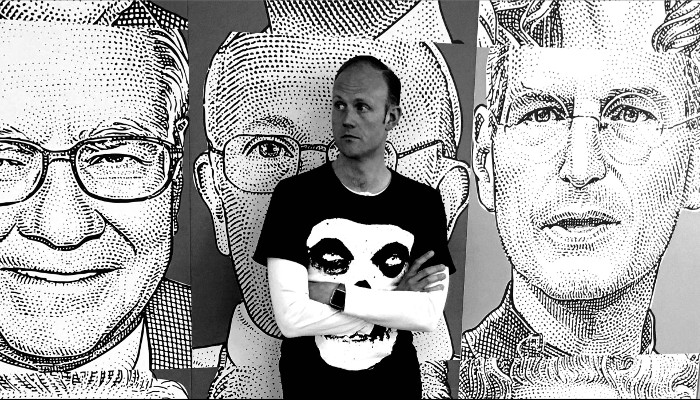It’s time for the next installment of my ongoing series of “Ten Questions” for thought-leaders and colleagues from the Product Management world! This month I’ve reached out to Paul Jackson, a longtime Product Manager from the UK who showed up on my radar a few years ago when he started to feature some of my posts in his articles and in his newsletter. Since then, we’ve exchanged thoughts on a wide variety of topics, and he was high on my list when I started up this ongoing series.
As Paul describes himself:
Paul is the publisher of Pivot Product Hits, a monthly newsletter on product strategy and a regular writer on all things product.
As a Product Manager and user-centred design practitioner, Paul has been building digital products and services for over 15 years. Currently Managing Director of Castle in the UK, he was Head of Product Management for The Times and The Sunday Times and Director of Product at Newsmart, an edtech SaaS that leverages premium news content from the Wall Street Journal.
Find out more at his personal website, Pivot, on Medium, Twitter or via his newsletter.
What does “Product Management” mean to you?
The DRI (Directly Responsible Individual), the SWN (Single Wringable Neck). Some use the analogy of the conductor of an orchestra, I prefer the analogy of a parent. Real success can only be measured long term. Product Managers succeed when their product succeeds.
How did you wind up becoming a Product Manager?
Do you remember that scene in The Shining where Delbert Grady tells Jack Nicholson, ‘“…you’ve always been the caretaker.”? I feel like I was always a Product Manager, even before I had real awareness of the role.
My interest in technology has always been bionic. Ie. in the role it can play in improving people’s lives. Believe it or not, my first job title was ‘Usability Engineer’ back when the concept was still relatively novel (thanks Jakob and Don!). From usability I transitioned into information architecture, interaction design and then user experience.
I probably first encountered ‘actual’ product managers at SXSW around 2009 and from that point on i knew it was what I wanted to do. I had to wait a couple of years to get the opportunity, but I moved from Head of UX to Mobile Product Manager for the The Times and The Sunday Times news publications in the UK.
I have to give a shout out to Marty Cagan at this point. His book, Inspired, was probably the most important reference point for me in those early days.
What one piece of advice would you give to someone who wants to be a Product Manager?
Always start with the outcomes your ideal customer is looking to achieve in their life. Be humble (and smart) enough to realize that no one’s life revolves around your product. Your product might be the most important thing in your life, but to your users it’s simply a means to a achieving a specific end. Products are servants, not masters.
What is the most commonly overlooked ability that separates the “1%” Product Manager from the rest?
2 things spring to mind:
Emotional intelligence (EQ). Raw analytical smarts is how too many companies recruit. But it’s the EQ that makes someone most effective.
A clear understanding of product value, specifically the ‘Unit of Value’ your product is delivering to your users. This is critical for effective roadmap development, backlog prioritization and the scaling of a product-driven business.
What’s the best advice you’ve personally received or read that positively affected your approach to Product Management?
FB’s Sam Lessin once said, “You have to learn how and when to ask for help.” It’s too easy to confuse asking for help with failure (or even weakness). This is emotion clouding judgement. The best operators deploy every resource necessary to get the outcome they need.
What are some of the most common themes that you see in the curation work for your Product Hits newsletter, and why do you think they’re so common?
I’ve refined the focus over time to reflect my own field of interest and to ensure the newsletter is sufficiently differentiated, especially as there are many more product management newsletters now then when i started (which is great).
Earlier this year I repositioned it as ‘Product Strategy for Product Leaders’ as I felt the executional aspects of PM (dual track agile, roadmap creation, lean practices etc) were very well served..
As you gain more experience in product, the alignment of a product strategy with the vision of the business becomes increasingly important. These days, Pivot Product Hits mainly covers the ‘Why’ of product rather than ‘How’.
This means themes like Jobs to be Done, product value, pricing strategy, behavioral economics and the emerging field of ‘neuro-design’ have come to the fore.
At this point, I have to give a shout out to Ben Thompson for his Stratechery project. My aim is to elevate the conversation within product to a similar level of strategic thinking.
What are the biggest challenges that entrepreneurs face as their product and company begin to grow in scale and complexity?
Monetization. Too many entrepreneurs focus on solving a functional or utilitarian problem and overlook the much greater challenge of who will pay. Any B2C startup also needs to consider their product in the context of the FANG quartet (Facebook, Amazon, Netflix, Google) and assess the likelihood that one of them will simply copy their idea and offer it for free.
The reason so much investment is moving towards B2B, SaaS and deep tech is that freemium is no longer a viable commercial strategy and defensibility is so critical. It’s impossible to overstate the resources and the reach of the FANG companies – it’s absolutely a zero sum game.
At what phase or size do you feel that a startup can best benefit from bringing on a dedicated Product Manager or Product Team?
It very much depends on the skillset of the founder(s). If the founder has built the v1.0 themselves then it’s usually at the point when they need to focus on growing their business and step away from the day to day of product development. This could be as late as Series A.
If the founder is non-technical, which is much more common in the UK, they’ll likely need a product expert much sooner; possibly even to build their MVP.
What advice would you give to a new Product Manager starting their new job with a small startup that’s been directed solely by the CEO or CTO?
Enjoy it! My experience is that the other extreme (being a PM in a complex, bureaucratic corporation) is 100x more frustrating. Your individual agency is negligible, even shipping consistently is rare.
PMs, by inclination, are doers not talkers. They like to get thing done, not just advance their careers. You’re far more empowered and effective in a startup, even if the risks are significantly higher. It’s the classic trade off between personal fulfillment and long term security. I’d always recommend a new Product Manager take the former over the latter.
What is the most overlooked or underappreciated capability that Product Managers bring to an organization?
Sam Lessin once remarked that ‘Good product managers are lubricants.’ Maybe that isn’t the best choice of words (!) but the insight is 100% spot on. Great product managers grease the parts so that the whole machine works. No one notices grease in an engine much but, without it, the different parts rapidly degrade and ultimately grind to a halt.



